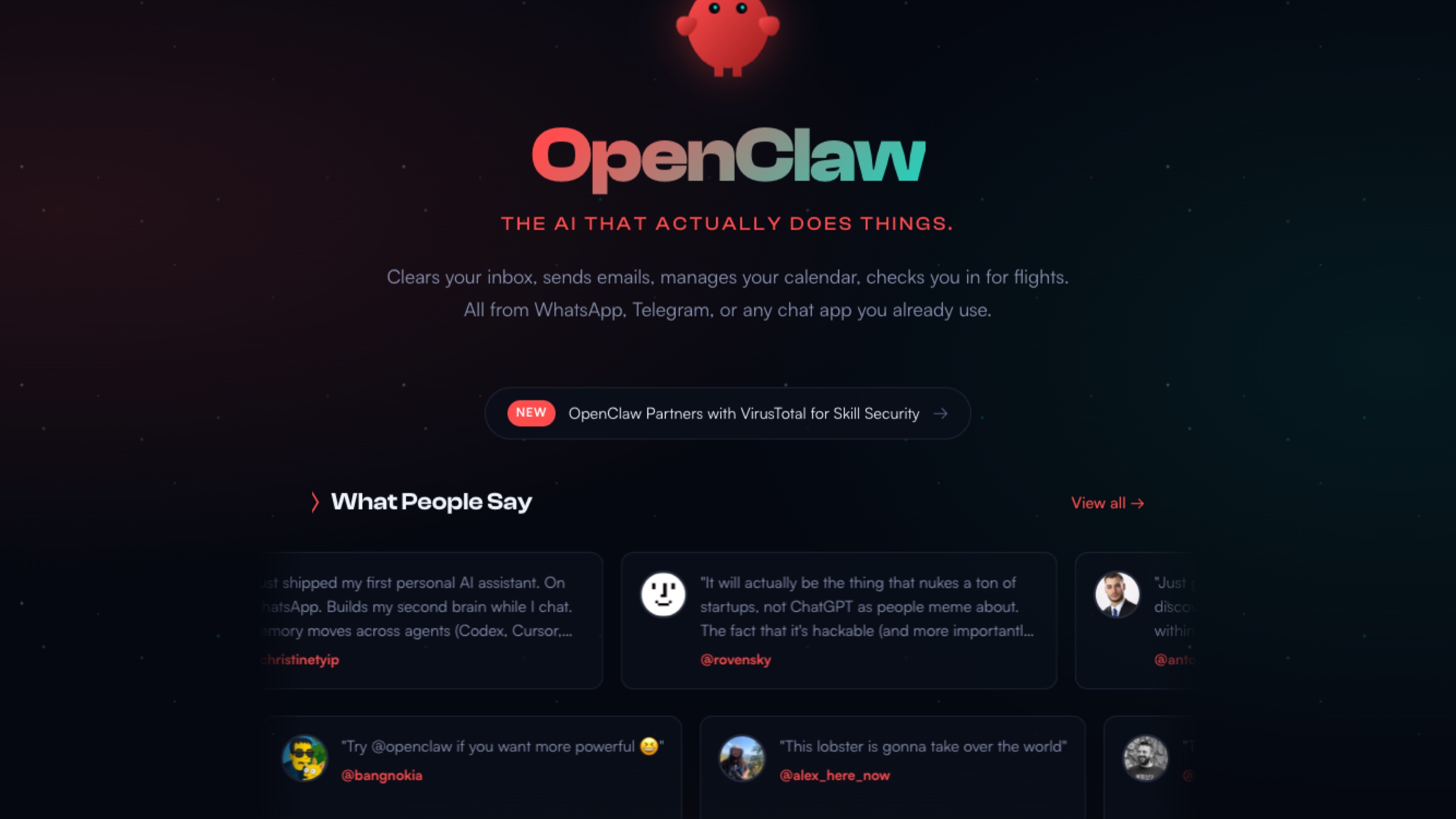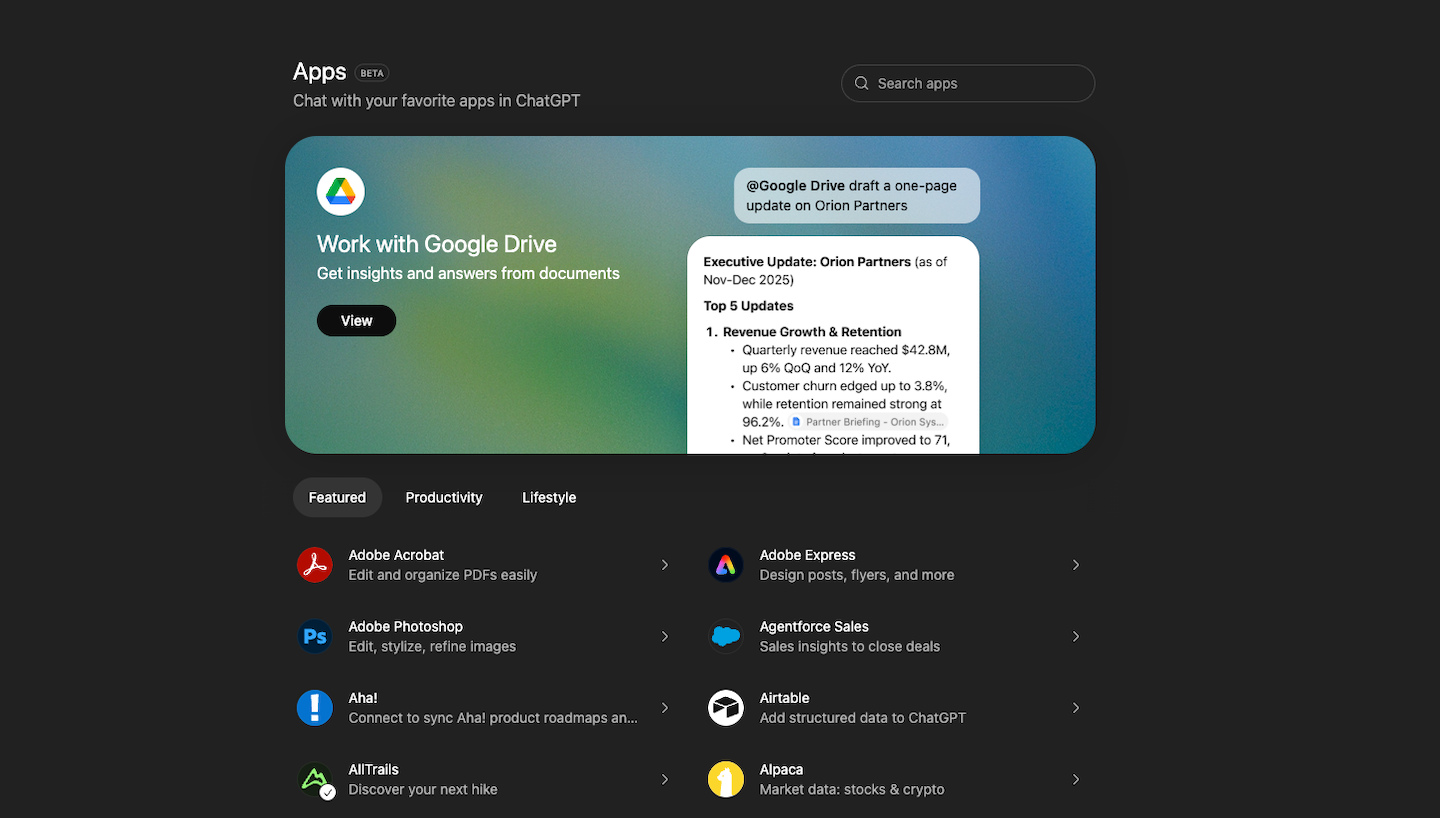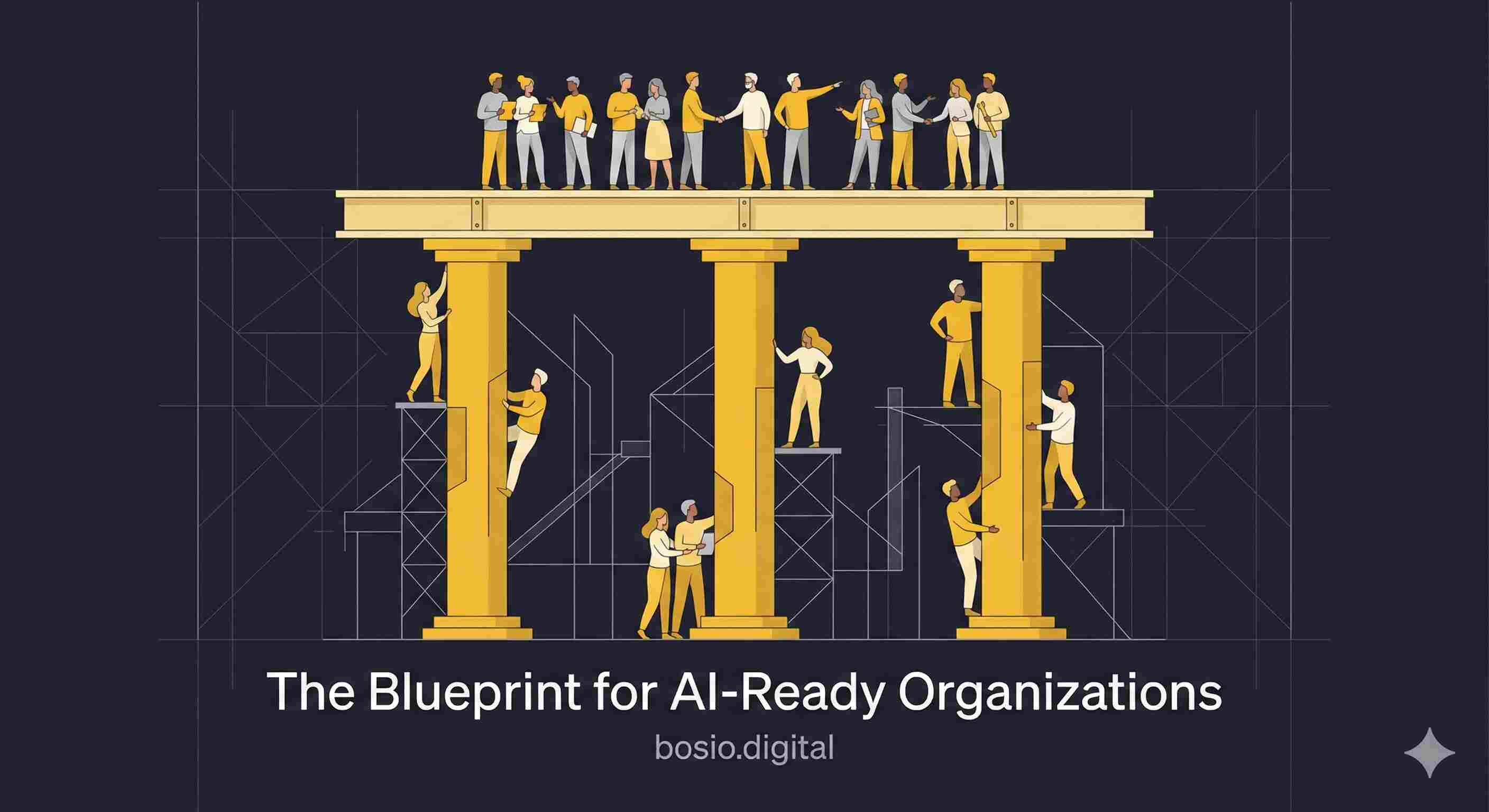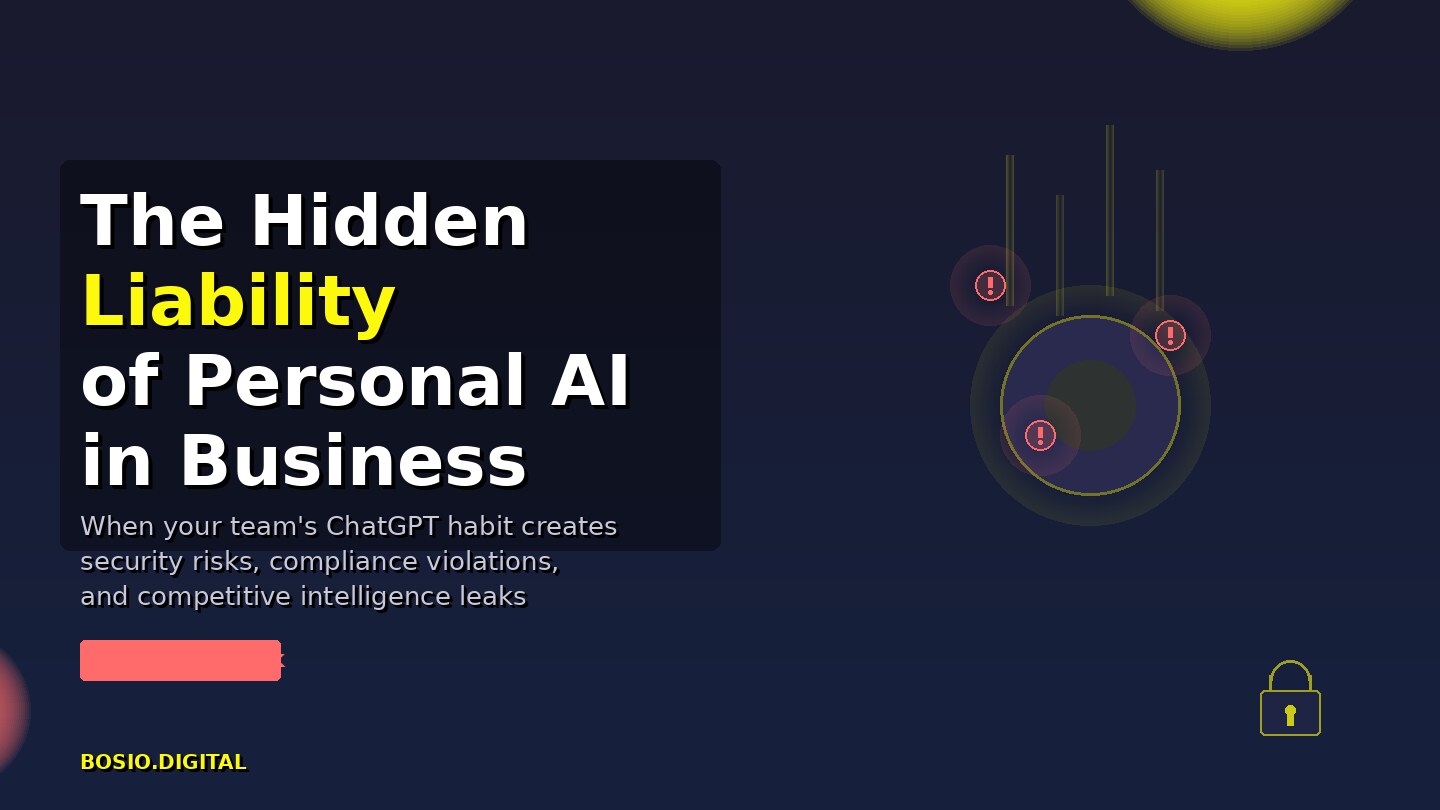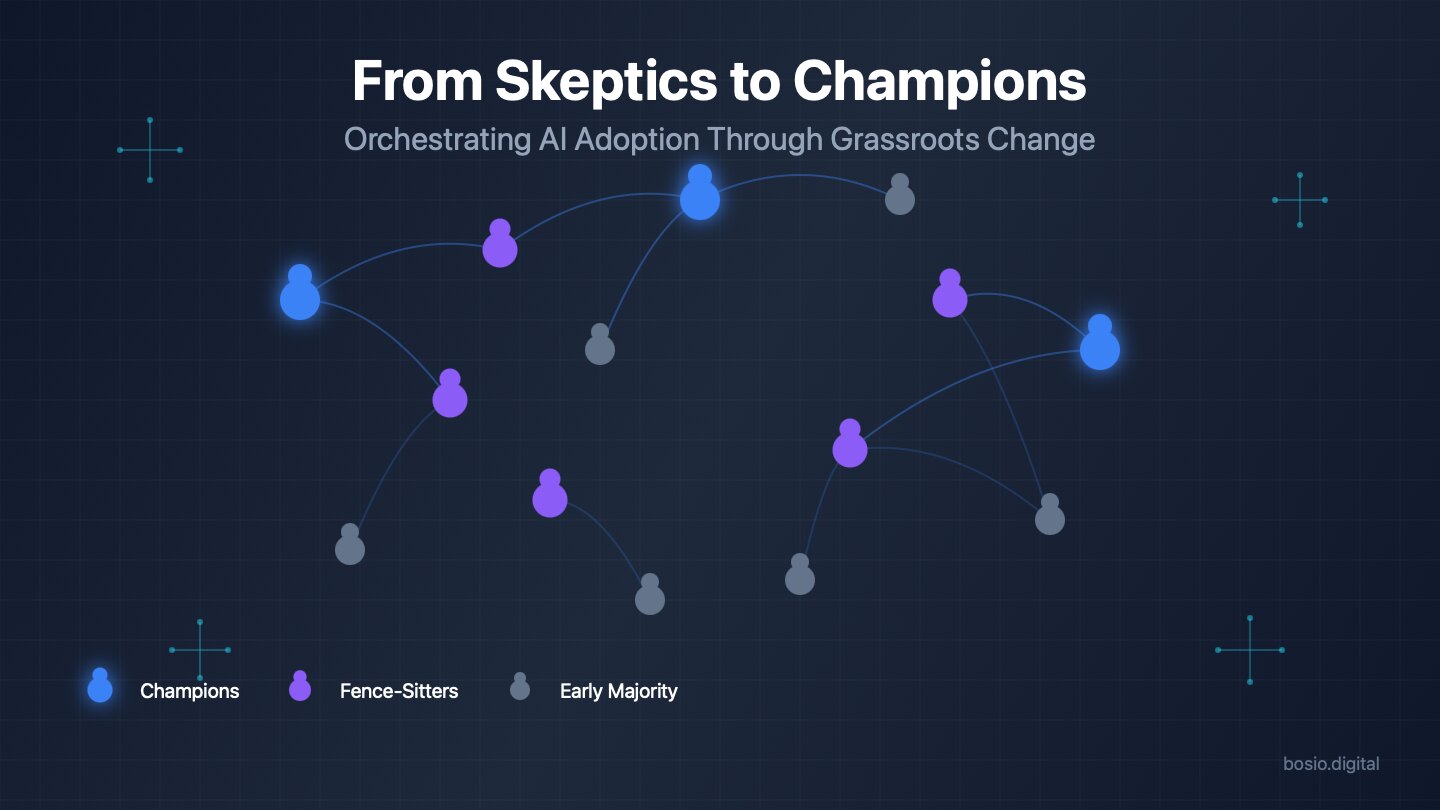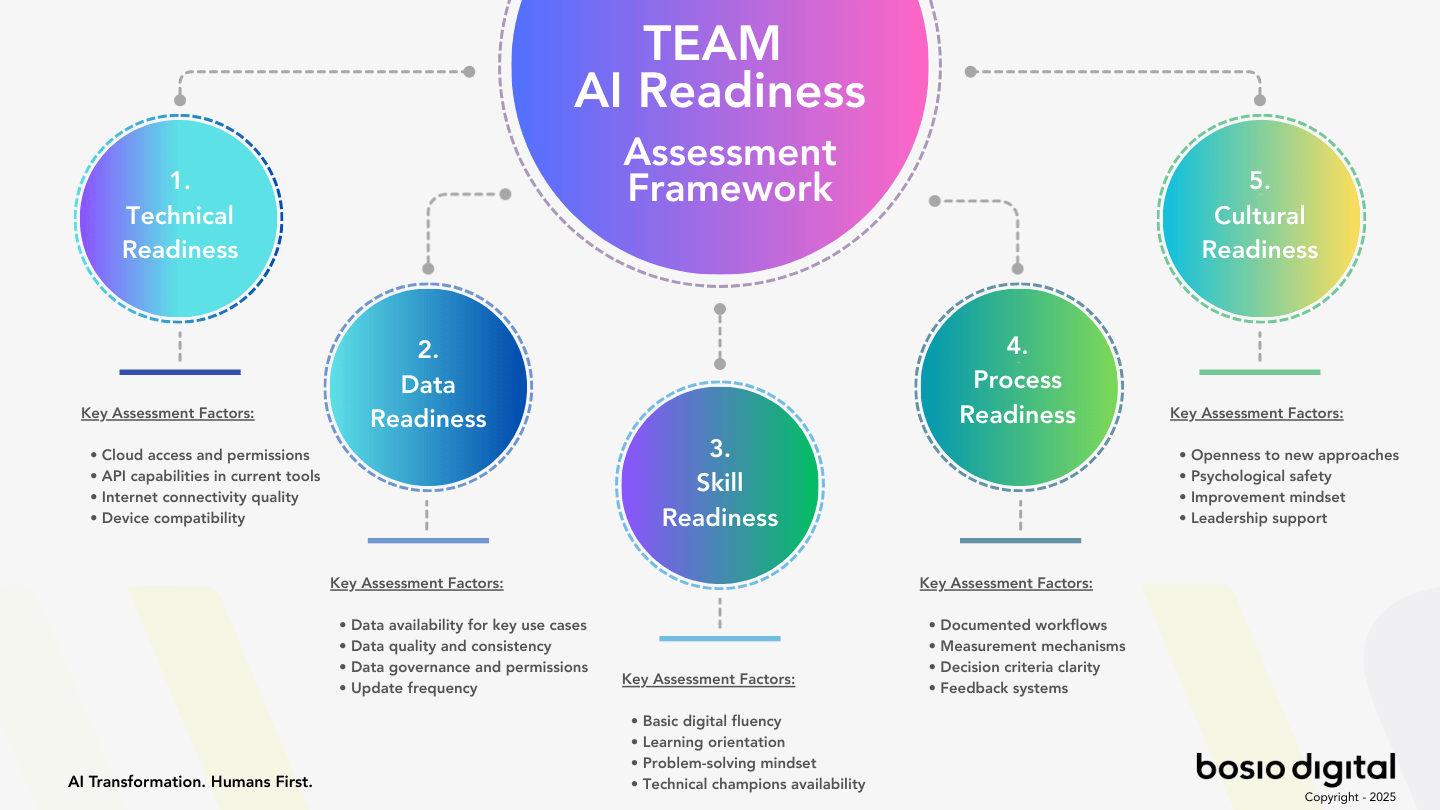
Our Philosophy: Humans at the Center of AI Evolution
In a world racing to automate thinking, we believe that true AI transformation isn't about surrendering human expertise to algorithms—it's about amplifying our uniquely human capabilities while preserving our sovereignty of thought.
This philosophy—AI Transformation. Humans First.—forms the foundation of our approach at bosio.digital. It emerged from a profound recognition: as AI capabilities accelerate, we stand at a pivotal moment in human history. The tools we're creating have unprecedented potential to either diminish or enhance what makes us distinctly human.
The path we choose matters deeply. When we implement AI with mindfulness about its relationship to human capability, we create systems that elevate our creativity, judgment, and purpose. When we implement without this awareness, we risk gradual erosion of the very qualities that give meaning to our work and lives.
Our human-centered approach isn't merely philosophical idealism—it's pragmatic wisdom. The organizations that thrive in the AI era won't simply be those that adopt technology fastest, but those that integrate it most thoughtfully. Those that enhance rather than replace human judgment. Those that amplify rather than automate human creativity. Those that deepen rather than delegate human purpose.
This is the essence of our Humans First approach: recognizing that AI's greatest value comes not from doing our thinking for us, but from creating space for more profound human thought. Not from replacing our creative spark, but from fanning it into flame. Not from diminishing our expertise, but from allowing us to apply it to increasingly meaningful challenges.
Within this broader Humans First philosophy, we've developed several methodologies and frameworks. One of the most powerful is Mindful Prompting—a specific framework that addresses how we interact with AI tools while preserving human agency and expertise.
Subscribe to our AI Briefing!
AI Insights That Drive Results
Join 500+ leaders getting actionable AI strategies
twice a month. No hype, just what works.
The Mindfulness Gap in AI Adoption
The current discourse on AI implementation has a critical blind spot. While endless articles explain which prompts yield better outputs, how to structure requests for optimal results, and which tools integrate most effectively, they miss perhaps the most crucial element: the mindset with which we approach these powerful tools.
This mindfulness gap manifests in concerning patterns we observe across organizations implementing AI:
- Intellectual Dependency: Teams begin to struggle with tasks they once handled independently when AI tools aren't available
- Diminished Critical Engagement: The habit of evaluating information carefully weakens with increasing AI reliance
- Creative Convergence: Work begins to reflect the patterns and limitations of AI models rather than human originality
- Psychological Disconnection: Team members feel reduced ownership and fulfillment in work partially generated by AI
- Epistemological Opacity: Understanding of how conclusions are reached diminishes as AI influences thought processes
These challenges run deeper than technical implementation problems—they reflect fundamental questions about human cognition, creativity, and purpose in an age of increasingly capable machines. They ask us to examine not just how we use these tools, but how they might be using us—reshaping our thinking, influencing our creativity, and potentially diminishing our capabilities through overreliance.
The consequences extend beyond productivity metrics and competitive advantage, touching on the essence of meaningful work and human flourishing. What happens to human expertise when we regularly outsource thinking? How does creative identity evolve when creation is collaborative with non-human intelligence? What becomes of professional judgment when decision-making is increasingly algorithm-influenced?
These questions demand thoughtful approaches to AI that go beyond technical implementation to address the human dimension of transformation—precisely what our Humans First philosophy encompasses.
Mindful Prompting: A Key Element of Our Humans First Approach
Mindful Prompting represents one powerful component of our broader Humans First methodology. It specifically addresses how we interact with generative AI tools through prompting, ensuring that these interactions enhance rather than diminish human capability.
At its essence, Mindful Prompting embodies a single powerful idea within our larger philosophy: in our direct interactions with AI tools, humans should maintain creative sovereignty and purposeful engagement. This principle—deceptively simple but increasingly challenging to maintain—reshapes how we approach every conversation with AI systems.
The framework ensures that when using AI tools, humans remain the authors of their work, the bearers of responsibility for outcomes, and the guardians of authenticity and purpose. It creates a relationship with AI that enhances rather than diminishes what makes us distinctly human.
The Three Pillars of Mindful Prompting
1. Intentional Engagement
Before interacting with AI, practitioners of Mindful Prompting cultivate awareness of their intentions by asking:
- What is my clear goal for this interaction?
- Where will my expertise and creativity add unique value?
- What specific contribution am I making to this process?
- How am I preserving my professional judgment?
This intentionality transforms AI from a replacement for thinking into an extension of thought. It establishes boundaries that protect human expertise while making space for AI's supportive capabilities. It shifts the relationship from dependency to partnership.
In practice, intentional engagement means beginning creative processes with human ideation before involving AI, defining success criteria based on human values and judgment, and identifying specific areas where AI can enhance rather than supplant human contribution.
2. Creative Leadership
In Mindful Prompting, humans maintain creative sovereignty by:
- Leading the creative process rather than following AI suggestions
- Making final decisions based on professional judgment and experience
- Contributing specialized expertise that AI cannot replicate
- Shaping the human elements that create resonance and meaning
Creative leadership ensures that AI serves human vision rather than the reverse. It positions AI as a collaborator rather than a director, preserving the human judgment that remains essential in contexts requiring empathy, ethical consideration, and deep domain understanding.
This pillar manifests in workflows where AI suggestions are deliberately evaluated against human expertise, where iterative refinement includes substantial human direction, and where the final output reflects a distinctly human perspective and purpose.
3. Reflective Practice
After each AI interaction, Mindful Prompting practitioners engage in reflection:
- Whether they maintained their original intention
- The authenticity of the result
- Their personal contribution to the outcome
- What they've learned that will improve future interactions
This reflection prevents the gradual erosion of human capability that often occurs with uncritical AI use. It creates awareness of emerging patterns and provides the opportunity to course-correct before dependency develops. It transforms each interaction into an opportunity for growth rather than a step toward replacement.
In organizational settings, reflective practice includes structured discussions about AI usage patterns, documentation of human contributions to AI-assisted work, and regular assessment of how AI tools are influencing thinking processes and outputs.
The Mindful Prompting Manifesto
The principles of Mindful Prompting are captured in our Manifesto—a concise articulation of the mindset that guides human-AI collaboration. It serves as both philosophical foundation and practical reminder for all AI interactions.
My Basic Approach to AI:
I remember:
As a creative person...
- I am the source of inspiration
- I remain the bearer of responsibility
- I maintain my authentic voice
- I use AI as an extension of my abilities
In my role...
- I lead the creative process
- I make the final decisions
- I contribute my experience
- I shape human contact
My Commitments:
Conscious Action:
"I use AI consciously and purposefully, not automatically and mindlessly."
Creative Leadership:
"I remain the author of my creative work, AI is my supporting tool."
Authenticity:
"I preserve my unique perspective and personal style."
Learning Mindset:
"I grow with technology, without becoming dependent on it."
My Practice:
Before each AI interaction, I ask myself:
- What is my clear goal?
- Where is my creative contribution?
- How do I preserve my expertise?
- What value am I creating?
After each AI interaction, I reflect:
- Have I maintained my intention?
- Is the result authentic?
- Where is my personal contribution?
- What have I learned?
My Guiding Principle:
"I use AI not to replace myself, but to extend myself, not to delegate, but to grow."
This manifesto serves as a touchstone for teams implementing AI. It creates a shared language about the human-AI relationship and reinforces the value of human expertise in an increasingly automated landscape.
The Philosophical Foundations of Human-AI Collaboration
The Mindful Prompting framework rests on philosophical considerations about the relationship between human and artificial intelligence:
Human Agency and Autonomy
At the heart of Mindful Prompting is a commitment to preserving human agency—our capacity to act independently, make meaningful choices, and shape our environment according to our values and purposes. As AI systems increasingly influence decision-making, protecting this agency becomes both more challenging and more essential.
The framework addresses this by creating specific moments for human choice and judgment, establishing practices that maintain awareness of AI influence, and reinforcing the ultimate authority of human decision-makers in the collaborative process.
The Nature of Creativity
Creativity involves more than generating novel outputs—it encompasses the quintessentially human capacity to find meaning, make unexpected connections, and express values through our work. While AI can simulate certain aspects of creativity, it lacks the lived experience, cultural context, and emotional depth that inform truly meaningful human creation.
Mindful Prompting preserves the human elements of the creative process, ensuring that AI enhances rather than replaces human creative expression. It recognizes that the most resonant work emerges from authentic human experience and perspective, amplified rather than supplanted by technology.
Expertise and Judgment
Professional expertise involves not just pattern recognition but contextual understanding, ethical consideration, and judgment developed through experience. The framework maintains space for these distinctly human capabilities, ensuring they remain active and continue to develop even as AI handles routine aspects of professional work.
By deliberately exercising judgment and applying expertise in each AI interaction, practitioners develop rather than diminish these capabilities, creating a virtuous cycle of human development alongside technological advancement.
Purpose and Meaning
Perhaps most fundamentally, Mindful Prompting addresses questions of purpose and meaning in work. It recognizes that human flourishing requires not just productivity but meaningful contribution—the sense that our unique capabilities matter and that our work expresses our values and aspirations.
By maintaining human authorship and contribution in AI-assisted work, the framework preserves the connection between effort and meaning that fuels engagement, satisfaction, and continued development. It ensures that AI serves human purpose rather than diminishing our sense of purpose through excessive automation of judgment and creativity.
These philosophical foundations inform every aspect of the Mindful Prompting approach, creating a framework that addresses not just how we use AI tools, but how we maintain our humanity while using them.
Subscribe to our AI Briefing!
AI Insights That Drive Results
Join 500+ leaders getting actionable AI strategies
twice a month. No hype, just what works.
Implementing Mindful Prompting in Your Organization
Mindful Prompting isn't just philosophical inquiry—it's a practical approach that transforms how teams work with AI. Here's how organizations begin implementing this framework:
1. Start with Awareness
Before introducing new AI tools, help teams understand the potential mindset traps that come with them. This includes education about automation bias, cognitive offloading, and the subtle ways AI can influence thinking patterns. Awareness is the foundation of mindfulness.
2. Establish Team Principles
Work with each team to develop their own adaptation of the Mindful Prompting Manifesto, reflecting their specific expertise and contribution. The process of creating these principles is as valuable as the principles themselves, as it prompts crucial conversations about human value in an AI-assisted workflow.
3. Design Intentional Workflows
Create workflows that incorporate specific moments for human contribution, decision-making, and reflection. This might include:
- Beginning creative processes with AI-free ideation
- Establishing checkpoints where human judgment evaluates AI suggestions
- Creating comparison processes between human-generated and AI-suggested approaches
- Scheduling regular reflection on how AI is influencing team thinking and outputs
4. Measure What Matters
Beyond efficiency metrics, track indicators of human capability development: creativity, critical thinking, decision quality, and unique contributions. This might include:
- Assessing the distinctiveness of work compared to competitors
- Tracking the development of expertise over time
- Measuring team members' confidence in their non-AI-assisted capabilities
- Evaluating the quality of human judgment in complex decisions
5. Practice Collective Reflection
Schedule regular sessions for teams to reflect on their AI usage patterns and how they're maintaining their unique expertise. This creates a community of practice around mindful AI use and allows for continuous improvement in human-AI collaboration.
Mindful Prompting in Different Professional Contexts
The application of Mindful Prompting varies across professional domains, addressing the specific human expertise that must be preserved in each context:
Creative Fields (Marketing, Design, Content)
Focus on maintaining authentic voice, original perspective, and emotional intelligence in communication. Workflows emphasize human-originated creative direction with AI enhancing execution.
Knowledge Work (Law, Finance, Consulting)
Emphasis on preserving critical judgment, contextual understanding, and professional responsibility. Practices include explicit documentation of human reasoning and judgment in decisions.
Technical Domains (Engineering, Data Analysis, Programming)
Priority on maintaining deep understanding of systems, creative problem-solving, and technical intuition. Approaches include analyzing AI suggestions rather than implementing them automatically.
Leadership and Strategy
Focus on preserving vision-setting, ethical judgment, and organizational wisdom. Methods include using AI for scenario generation while maintaining human leadership in values-based decisions.
Each context requires tailored applications of the core principles, but all share the fundamental approach of maintaining human sovereignty while leveraging AI's capabilities.
The Business Case for Mindful Prompting
Beyond preserving human capability, Mindful Prompting delivers tangible business benefits:
Competitive Differentiation
As AI tools become ubiquitous, the ability to use them in ways that produce distinctive rather than generic output becomes crucial for differentiation.
Risk Mitigation
Maintaining human oversight and understanding reduces risks associated with AI hallucinations, biases, and limitations.
Talent Development and Retention
By preserving meaningful human contribution, organizations create more satisfying work environments that attract and retain top talent.
Adaptability and Resilience
Teams that maintain their core capabilities while leveraging AI are better positioned to adapt to technological changes and market shifts.
Innovation Capacity
True breakthrough innovation requires human creativity and insight. Mindful Prompting preserves and enhances these capabilities rather than allowing them to atrophy.
The organizations that implement Mindful Prompting now are developing a crucial competitive advantage for the AI era: teams that can leverage AI's capabilities while preserving and enhancing uniquely human expertise.
The Future of Human-AI Collaboration
As AI capabilities continue to advance, the distinction between mindful and mindless implementation will become even more consequential.
We envision a future where organizations don't just become more efficient through AI, but actually enhance their distinctly human capabilities through thoughtful human-AI collaboration. Where professional development includes both technical AI skills and the metacognitive abilities needed to maintain human sovereignty. Where the value of human judgment, creativity, and purpose is amplified rather than diminished by technological advancement.
This vision isn't utopian—it's a practical possibility that requires intentional design of our relationship with AI. The choices we make now about how we implement these powerful tools will shape not just organizational performance but the future of human work and creativity.
The future doesn't belong to those who simply adopt AI fastest—it belongs to those who integrate it most thoughtfully, preserving human creativity, judgment, and purpose in the process.
Our Approach: AI Adoption. Humans First.
At bosio.digital, we've developed a comprehensive philosophy and methodology around human-centered AI transformation. Our Humans First approach encompasses multiple frameworks and practices, with Mindful Prompting being a key component specifically focused on how we interact with generative AI tools.
This holistic approach helps organizations harness AI not as a replacement for human thinking, but as a tool that enhances your team's natural abilities to design, create, and solve complex problems.
Through our workshops, consulting, and implementation support, we guide teams in developing the mindsets and practices that ensure AI implementation strengthens rather than diminishes professional expertise. We address everything from technical implementation to team dynamics to organizational culture—all through the lens of human-centered transformation.
Our frameworks, including Mindful Prompting, provide practical approaches to achieving the perfect balance: empowering your staff to focus on what humans do best—innovative thinking, strategic decision-making, and maintaining quality standards—while letting AI handle routine tasks and enhance productivity.
Are you ready to implement AI in a way that puts humans first? Contact us to learn more about our workshops and consulting services, and how we can help your organization achieve thoughtful, human-centered AI adoption.






